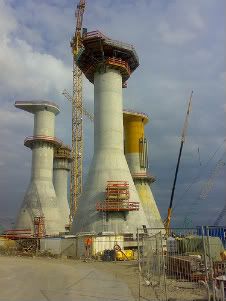Renewables hit by financial crisis: banks pull out of offshore wind company C-Power
 The green energy sector is being hit by the financial crisis in a dramatic way. Banks no longer have the capacity nor the will to fund projects that often require large investments and serious risks. An example comes from Belgium, where C-Power, the company planning to build the first large-scale farshore wind power farm, cannot implement its project due to a lack of cash. It asks the government for a bailout.
The green energy sector is being hit by the financial crisis in a dramatic way. Banks no longer have the capacity nor the will to fund projects that often require large investments and serious risks. An example comes from Belgium, where C-Power, the company planning to build the first large-scale farshore wind power farm, cannot implement its project due to a lack of cash. It asks the government for a bailout.C-Power plans to build a 300MW wind farm on the Thornton Bank in the North Sea, some 27 to 30km offshore. The plant would gradually become a crucial nexus that weaves other future wind farms in North-Western Europe together. The first farm consists of 30 giant wind turbines, 6 of which are under construction. These first 6 turbines were financed by Dexia Bank, one of the banks that ran into difficulties and were bailed out by the Belgian government.
C-Power does not find the money to build the other 24 turbines. In total, the company needs around €850 million for the entire project, of which €152m was found before the credit crisis broke out. Today, no bank is willing to put up the remainder. Borrowing more than half a billion euros is not a small operation, especially in a landscape of bailed-out banks that are still fragile. According to Filip Martens, C-Power's CEO, the project will collapse if the money cannot be found by april of next year.
Bailout
The wind power company is therefor asking for a large package of government assistance - a question that is dividing the country. C-Power suggests tapping the SynATOM Fund, a multi-billion euro government fund created to finance the future the phase-out of Belgium's nuclear power plants and to store radioactive waste. SynATOM contains €5.2 billion, and is based on a tax paid by all electricity consumers in the country. Belgians have been paying this tax for years, with the specific aim to build up cash to finance the nuclear phase out. The fund was not intended to subsidize or provide loans to private companies.
However, there are many people in favor of supporting C-Power with cash from SynATOM. The reasons are that the nuclear phase out is only planned for the medium term, so the fund can still be rebuilt after the worst of the credit crunch is over. Meanwhile, investing in renewables is an action that can't wait - tackling climate change and energy insecurity requires initiatives today. What is more, C-Power is asking for a loan, which it will repay with interest, - not for a subsidy. Finally, two other energy companies, active in the fossil fuel sector, have been given access to money from SynATOM in the past, so there is no reason why the government shouldn't support a green energy company:
 energy :: sustainability :: biomass :: bioenergy :: wind power :: renewables :: credit crisis :: climate change :: Belgium ::
energy :: sustainability :: biomass :: bioenergy :: wind power :: renewables :: credit crisis :: climate change :: Belgium :: The C-Power case shows that investments in the renewables sector are still seen as high-risk, and are not given priority by the financial institutions. This despite the fact that all studies and projections indicate that green projects make very good business sense and are guaranteed strong returns over the medium term - even when taking into account the credit crunch and a recession.
Declining oil, gas and coal prices may play a role in the reluctance of banks to step into renewables today. But here too the price collapse is only a temporary phenomenon. Most recently, the IEA, the West's energy watchdog, issued a strong warning that fossil fuel based energy prices will soon begin to rise again to levels seen before the credit crisis.
Picture: In limbo: the giant concrete foundations that will be placed on the sea-bed and on which the wind turbines would be build. Credit: C-Power.
References:
De Standaard: Geen geld meer voor windpark [No more cash for wind farm] - November 12, 2008.
De Redactie: Banken geven geen geld meer voor wind park [Banks refuse to give money for wind farm] - November 12, 2008.
 --------------
--------------
 Taiwan's Feng Chia University has succeeded in boosting the production of hydrogen from biomass to 15 liters per hour, one of the world's highest biohydrogen production rates, a researcher at the university said Friday. The research team managed to produce hydrogen and carbon dioxide (which can be captured and stored) from the fermentation of different strains of anaerobes in a sugar cane-based liquefied mixture. The highest yield was obtained by the Clostridium bacterium.
Taiwan's Feng Chia University has succeeded in boosting the production of hydrogen from biomass to 15 liters per hour, one of the world's highest biohydrogen production rates, a researcher at the university said Friday. The research team managed to produce hydrogen and carbon dioxide (which can be captured and stored) from the fermentation of different strains of anaerobes in a sugar cane-based liquefied mixture. The highest yield was obtained by the Clostridium bacterium.








0 Comments:
Post a Comment
Links to this post:
Create a Link
<< Home